新概念英语4-课文资料讲解
新概念英语第四册 Lesson40 课文音标版讲义

40Waves are the children of the struggle between ocean and atmosphere, the ongoing signatures of infinity. weɪvz ɑːðəˈʧɪldrənɒvðəˈstrʌɡl bɪˈtwiːnˈəʊʃən ænd ˈætməsfɪə, ði ˈɒŋˌɡəʊɪŋˈsɪɡnɪʧəzɒv ɪnˈfɪnɪti.海浪是大海和空气相斗的产物,无限的一种不间断的标志。
海浪是大海和空气相斗的产物,无限的一种不间断的标志。
Rays from the sun excite and energize the atmosphere of the earth, awakening it to flow, to movement, to rhythm, to life. reɪz frɒm ðə sʌn ɪkˈsaɪt ænd ˈenəʤaɪz ði ˈæt məsfɪər ɒv ði ɜːθ,əˈweɪknɪŋɪt tuː fləʊ, tuːˈm uːvmənt, tuːˈrɪðəm, tuː laɪf.太阳光刺激了地球的大气层,并给予它能量;阳光使空气开始流动,产生节奏,获得生命。
太阳光刺激了地球的大气层,并给予它能量;阳光使空气开始流动,产生节奏,获得生命。
The wind then speaks the message of the sun to the sea and the sea transmits it on through waves----an ancient, exquisite, powerful message. ðə wɪnd ðen spiːks ðəˈmesɪʤɒv ðə sʌn tuː ðəsiː ænd ðəsiːtrænzˈmɪts ɪt ɒn θruː weɪvz----ən ˈeɪnʃᵊnt, ˈekskwɪzɪt, ˈpaʊəfʊl ˈmesɪʤ.然后,风把太阳的住处带给了大海,海洋用波浪的形式传递这个信息-- 一个源过流长、高雅而有力的信息。
新概念英语第4册课文及译文
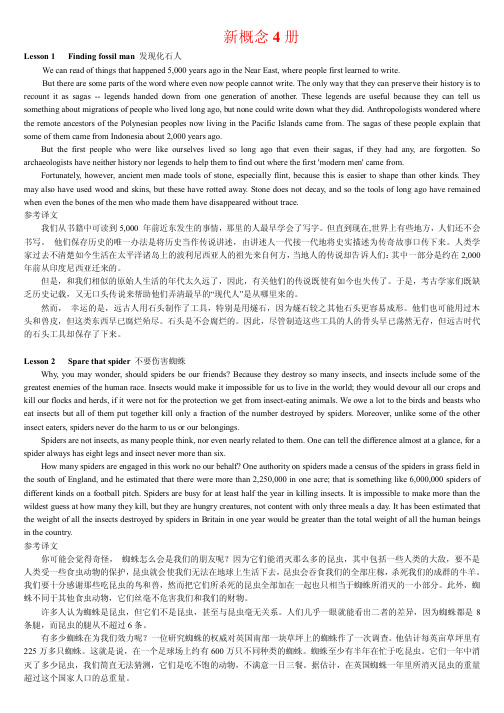
fo emag s'dlihc a revo woble reh gnivom yb ,llits regnarts ,dna neercs euqapo na hguorht repapswen a daer ot elba saw ehs stset eseht
gniruD .cilbupeR laredeF naissuR eht fo htlaeH fo yrtsiniM eht fo noissimmoc laiceps a yb stset fo seires a nevig saw ehs lirpA ni dna .seldnub ni pu enod erew yeht yaw eht debircsed neve dna ,ereht yawa dekcol
erehw derednow stsig oloporhtnA .did yeht tahw nwod etirw dluoc enon tub ,oga gnol devil ohw elpoep fo snoitargim tuoba gnihtemos .etirw ot denrael tsrif elpoep erehw ,tsaE raeN eht ni oga sraey 000,5 deneppah taht sgniht fo daer nac eW
de niamer evah oga gnol fo sloot eht os dna ,yaced ton seod enotS .yawa dettor evah eseht tub ,sniks dna doow desu evah osla yam yehT .sdnik rehto naht epahs ot reisae si siht esuaceb ,tnilf yll aicepse ,enots fo sloot edam nem tneicna ,revewoh ,y letanutroF oS .nettogrof era ,yna dah yeht fi ,sagas rieht neve taht oga gnol os devil sevlesruo ekil erew ohw elpoep tsrif eht tuB .morf emac 'nem nredom' tsrif eht erehw tuo dnif ot meht pleh ot sdnegel ron yrotsih rehtien evah stsigoloeahcra .oga sraey 000,2 tuoba aisenodnI morf emac meht fo emos
新概念英语第四册课件讲解

There has long been a superstition among mariners that porpoises will save drowning men by pushing them to the surface, or protect them from sharks by surrounding them in defensive formation. 1.shark n. 鲨鱼 / he is a shark 他是个大骗子 2.There has long been…long 表完成时 = for a long time, for long, 一般在助动词后 3.superstition : 迷信 同位语从句 …mariners that …. 4.formation : 阵形 5.defensive : 防御型的 offensive : 进攻型的
3
Contents Lesson 18 Porpoises
On the occasions when they have pushed to shore an unconscious human being they have much more likely done it out of curiosity or for sport, as in riding the bow waves of a ship. 当它们偶尔把一个失去知觉的人推到岸边时,更大的可能是 出于好奇或游戏,就像它们追逐被船首犁开的浪花一样。
7
Contents Lesson 18 Porpoises
Whether it be bird, fish or beast, the porpoise is intrigued with anything that is alive. 海豚对凡是活的东西都感兴趣,不管是鸟、是鱼, 还是野兽。
新概念英语第四册Lesson 20课文音标版讲义

20How it came about that snakes manufactured poison is a mystery. haʊɪt keɪm əˈbaʊt ðæt sneɪks ˌmænjʊˈfækʧəd ˈpɔɪzn ɪz əˈmɪstəri.蛇是怎样产生毒液的,这是一个谜。
蛇是怎样产生毒液的,这是一个谜。
Over the periods their saliva, a mild, digestive juice like our own, ˈəʊvə ðəˈpɪərɪədz ðeə səˈlaɪvə, ə maɪld, dɪˈʤestɪv ʤuːs laɪk ˈaʊər əʊn,蛇的唾液本来和我们人的消化液一样柔和,但经过漫长的时间,蛇的唾液本来和我们人的消化液一样柔和,但经过漫长的时间,was converted into a poison that defies analysis even today. wɒz kənˈvɜːtɪd ˈɪntuːəˈpɔɪzn ðæt dɪˈfaɪz əˈn æləsɪs ˈiːvən təˈdeɪ.演变成了今天仍无法分析清楚的毒液。
演变成了今天仍无法分析清楚的毒液。
It was not forced upon them by the survival competition; ɪt wɒz nɒt fɔːstəˈpɒn ðem baɪ ðə səˈvaɪvəl ˌkɒmpɪˈtɪʃᵊn;毒液不是生存竞争强加给它们的,毒液不是生存竞争强加给它们的,they could have caught and lived on prey without using poison, ðeɪ kʊd hæv kɔːt ænd lɪvd ɒn preɪ wɪˈðaʊt ˈj uːzɪŋˈpɔɪzn,它们也可以不用毒液捕捉动物而生存,它们也可以不用毒液捕捉动物而生存,just as the thousands of non-poisonous snakes still do. ʤʌst æz ðəˈθaʊzəndz ɒv nɒn-ˈpɔɪznəs sneɪk s stɪl duː.就像今天成千上万的无毒蛇那样。
新概念英语4-课文资料讲解

NEW CONCEPTENGLISH(IV) (new version)2Lesson1 Finding Fossil manWe can read of things that happened 5,000 years ago in the Near East, where people first learned to write. But there are some parts of the world where even now people cannot write. The only w ay that they can preserve their history is torecount it as sagas--legends handed down from one generation of story-tellersto another. These legends are useful because they can tell us somethin g aboutmigrations of people who lived long ago, but none could write down what they did. Anthropologists wondered where the remote ancestors of the Polynesianpeoples now living in th e Pacific Islands came from. The sagasof these peopleexplain that some of them came from Indo nesia about 2,000 years ago.But the first people who were like ourselves lived so long ago that ev en theirsagas, if they had any,are forgotten. Soarchaeologists have neither history nor legends to help them to find out where the first 'modern men' came from.Fortunately, however, ancient me n made tools of stone, especially flint, becausethis is easier to shape than other kinds. They may also have used woodand skins, but these have rotted away. Stone does not decay,and so the tool s oflong ago have remained when even the bones of the men who made them have disappeared without trace.3Lesson2 Spare that spiderWhy, you may wonder, should spiders be our friends ? Because they destroy somany insects, and insects include some of the greatest enemies of the humanrace. Insects would make it impossible for us to live in the world; they woulddevour all our crops and kill our flocks and herds, if it were not for the protectionwe get from insect-eating animals. We owe a lot to the birds and beasts wh o eat insects but all of them put together kill only a fraction of the number destroyed by spiders. Moreover, unlike some of the other insect eaters, spiders never dothe least harm to us or our bel ongings.Spiders are not insects, as many people think, nor even nearly related to them.One can t ell the difference almost at a glance for a spider always has eight legsand an insect never more th an six.How many spiders are engagedin this work on our behalf ? One authority on spiders made a census of the spiders in a grass field in the south of England, andhe estimated that there were more than 2,250,000 in one acre, that is something like 6,000,000 spiders of different kinds on a f ootball pitch. Spiders are busy for at least half the year in killing insects. It is impossible to make more than the wildest guess at how many they kill, but they are hungry creatures, not content wi th only three meals aday.It has been estimated that the weight of all the insects destroyed byspi ders in Britain in one year would be greater than the total weight of all the human beings in the c ountry.T. H. GILLESPIESpare that Spider from The ListeneLesson 3 Matterhorn manModern alpinists try to climb mountains by aroute which will give them goodsport, and the moredifficult it is, the more highly it is regarded. In the pioneeringdays, however, this was not the case at all. The early climbers were looking forthe easiest way to the top because the summit was the prize they sought, especially if it had never been attained before. It is true that during their explor ations they often faced difficulties and dangers of the most perilous nature, equipped in a manne r which would make a modern climber shudder at the thought, but they did not go out of their w ay to court such excitement. They had a single aim,a solitary goal--the top!It is hard for us to reali ze nowadays how difficult it was for the pioneers. Exceptfor one or two places such as Zermatt an d Chamonix, which had rapidly become popular, Alpine villages tended to be impoverished settlements cut off from civilization by the high mountains. Such inns as there were were generally dirty and flea-ridden; the food simply local cheeseaccompanied by bread often t welve months old, all washed down with coarse wine. Often a valley boasted no inn at all, and cli mbers found shelter wherever they could--sometimes with the local priest (who was usually as p oor as his parishioners), sometimes with shepherds or cheesemakers. Invariably the background was the same: dirt and poverty, and very uncomfortable. For men accustomed to eating seven-course dinners and sleeping between fine linen sheets at home, the change to the Alps mu st have been very hard indeed.5Lesson4 Seeing handsInthe Soviet Union several caseshave been reported recently of people who can read and detect colours with their fingers, and even see through solid doors and walls. One case concerns an 'ele ven-year-old schoolgirl, Vera Petrova, who has normal vision but who can also perceive things wit h different parts of her skin, and through solid walls. This ability was first noticed by her father. O ne day she came into his office and happened to put her hands on the door of a locked safe. Sudd enly she asked her father why he kept so many old newspapers locked away there, and even desc ribed the way they were done up in bundles.Vera's curious talent was brought to the notice of a s cientific research institute in the town of UIyanovsk, near where she lives, and in April she was giv en a series of tests by a special commission of the Ministry of Health of the RussianFederal Repu blic. During these tests she was able to read a newspaper through an opaque screen and, strange r still, by moving her elbow over a child's game of Lotto she was able to describe the figures and c olours printed on it; and, in another instance, wearing stockings and slippers, to make out with h er foot the outlines and colours of a picture hidden under a carpet. Other experiments showed th at her knees and shoulders had a similar sensitivity. During all these tests Vera was blindfold; and, indeed, except when blindfold she lacked the ability to perceive things with her skin. lt was also f ound that although she could perceive things with her fingers this ability ceased the moment her hands were wet.6Lesson 5 YouthPeople are always talking about' the problem of youth '. If there is one —which I take leave to doubt --then it is older people who create it, not the young themselves. Let us get down to fundamentals and agree that the young are after all human bei ngs--people just like their elders. There is only one difference be tween an old man and a young one: the young man has a glorio us future before him and the old one has a splendid future behi nd him: and maybe that is where the rub is. When I was a teena ger,I felt that I was just young and uncertain --that I was a new b oy in a huge school, and I would have been very pleased to be r egarded as something so interesting as a problem. For one thin g, being a problem gives you a certain identity, and that isone o f the things the young are busily engaged in seeking.I find youn g people exciting. They have an air of freedom, and they have n ot a dreary commitment to mean ambitions or love of comfort. They are not anxious social climbers, and they have no devotion to material things. All this seems to me to link them with life, a nd the origins of things. It's asif they were in some sense cosmi c beings in violent and lovely contrast with us suburban creatur es. All that is in my mind when I meet a young person. He may b e conceited, illmannered, presumptuous of fatuous, but I do no t turn for protection to dreary clich a bout respect for elders-- as if mere agewere a reason for respect. I accept that we are e quals, and I will argue with him, as an equal, if I think he is wron g. Lesson 6 The sporting spiritI am always amazed when I hear people saying that sport create s goodwill between the nations, and that if only the common pe oples of the world could meet one another at football or cricket , they would have no inclination to meet on the battlefield. Eve n if one didn't know from concrete examples (the 1936 Olympic Games, for instance) that international sporting contes ts lead to orgies of hatred, one could deduce it from general pri nciples.Nearly all the sports practised nowadays are competitive. You pl ayto win, and the game has little meaning unless you do youru tmost to win. On the village green, where you pick up sides and no feeling of local patriotism is involved, it is possible to play si mply for the fun and exercise: but as soon as the question of pr estige arises, assoon asyou feel that you and some larger unit will be disgraced if you lose, the most savage combative instinct s are aroused. Anyone who has played even in a school football match knows this. At the international level sport is frankly mim ic warfare. But the significant thing is not the behaviour of the p layers but the attitude of the spectators: and, behind the specta tors, of the nations. who work themselves into furies over these absurd contests, and seriously believe--at any rate for short per iods--that running, jumping and kicking aball are tests of nation al virtue.刘晓华liuxiaohua72@ 8Lesson7 BatsNot all sounds made by animals serve as language, and we have only to turn to that extraordinary discovery of echo-location in bats to see a casein which thePeople are always talking about' the problem of youth '. If there is one —which I take leave to doubt --then it is older people wh o create it, not the young themselves. Let us get down to fundamentals and agree that the young are after all human bei ngs--people just like their elders. There is only one difference be tween an old man and a young one: the young man has a glorio us future before him and the old one has a splendid future behi nd him: and maybe that is where the rub is. When I was a teena ger, I felt that I was just young and uncertain --that I wasanew b oyin a huge school, and I would have been very pleased to ber egarded as something so interesting as a problem. For one thin g, being a problem gives you a certain identity, and that isone o f the things the young are busily engaged in seeking.I find youn g people exciting. They have an air of freedom, and they haven ot a dreary commitment to mean ambitions or love of comfort. They are not anxious social climbers, and they have no devotion to material things. All this seems to me to link them with life, a ndthe origins of things. It's asif they were in some sense cosmi c beings in violent and lovely contrast with us suburban creatur es. All thatis in my mind when I meet a young person. He may b e conceited, illmannered, presumptuous of fatuous, but I do no t turn for protection to dreary clich a bout respect for elders-- asifmere agewere areasonfor respect.Iacceptthat wearee quals,andIwill arguewith him,asanequal,ifIthink heiswron g.7Lesson6 The sporting spiritI am always amazed when I hear people saying that sport create s goodwill between the nations, and that if only the common pe oples of the world could meet one another at football or cricket , they would have no inclination to meet on the battlefield. Eve n if one didn't know from concrete examples (the 1936 Olympic Games, for instance) that international sporting contes ts lead to orgies of hatred, one could deduce it from general pri nciples.Nearly all the sports practised nowadays are competitive. Youpl ayto win, and the game has little meaning unless you do youru tmost to win. Onthe village green, where you pick up sides and no feeling of local patriotism is involved, it is possible to play si mply for the fun and exercise: but as soon as the question of pr estige arises,assoon asyou feel that you and some larger unit will be disgraced if you lose, the most savagecombative instinct sare aroused. Anyone who has played even in a school football match knowsthis. Atthe international level sport is frankly mim ic warfare. But the significant thing isnot the behaviour of the p layers but the attitude of the spectators: and, behind the specta tors, of the nations. who work themselves into furies over these absurd contests, and seriously believe--at any rate for short per iods--that running, jumping and kicking aball are tests of nation al virtue.刘晓华liuxiaohua72@ 8Lesson7 BatsNot all sounds made by animals serve as language, and we have only to turn to that extraordinary discovery of echo-location in bats to see a casein which thePeople are always talking about' the problem of youth '. If there is one—whichI take leave to doubt --then it is older people wh o create it, not the young themselves. Let us get down to fundamentals and agree that the young are after all human bei ngs--people just like their elders. There is only one difference be tween an old man and a young one: the young man has a glorio us future before him and the old one has a splendid future behi nd him: and maybe that is where the rub is. When I was a teena ger, I felt that I was just young and uncertain --that Iwasanew b oy in a huge school, and I would have been very pleased to be r egarded as something so interesting as a problem. For one thin g, being a problem gives you a certain identity,and that isone o f the things the young are busily engaged in seeking.I find youn g people exciting. They have an air of freedom, and they have n ot a dreary commitment to mean ambitions or love of comfort. They are not anxious social climbers, and they have no devotion to material things. All this seems to me to link them with life, a ndthe origins of things. It's asif they were in some sense cosmi c beings in violent and lovely contrast with us suburban creatur es. All that is in my mind when I meet a young person. He may b e conceited, illmannered, presumptuous of fatuous, but I do no t turn for protection to dreary clich a bout respect for elders-- asifmere agewere areasonfor respect.Iacceptthat weare e quals,and Iwill arguewith him,asan equal,ifIthink heiswron g.Lesson 6 The sporting spiritI am always amazed when I hear people saying that sport create s goodwill between the nations, and that if only the common pe oples of the world could meet one another at football or cricket , they would have no inclination to meet on the battlefield. Eve n if one didn't know from concrete examples (the 1936 Olympic Games, for instance) that international sporting contes ts lead to orgies of hatred, one could deduce it from general pri nciples.Nearly all the sports practised nowadays are competitive. You pl ayto win, and the game has little meaning unless you do your u tmost towin. On the village green, where you pick up sides and no feeling of local patriotism is involved, it is possible to play si mply for the fun and exercise: but as soon as the question of pr estige arises, as soon asyou feel that you and some larger unit will be disgraced if you lose, the most savage combative instinct s are aroused. Anyone who has played even in a school football match knows this. At the international level sport is frankly mim ic warfare. But the significant thing is not the behaviour of the p layers but the attitude of the spectators: and, behind the specta tors, of the nations. who work themselves into furies over these absurd contests, and seriously believe--at any rate for short per iods--that running, jumping and kicking aball are tests of nation al virtue.刘晓华liuxiaohua72@ 8Lesson7 BatsNot all sounds made by animals serve as language, and we have only to turn to that extraordinary discovery of echo-location in bats to see a casein which the。
新概念第四册课文新概念第四册课文翻译及学习笔记【Lesson40、41、42】
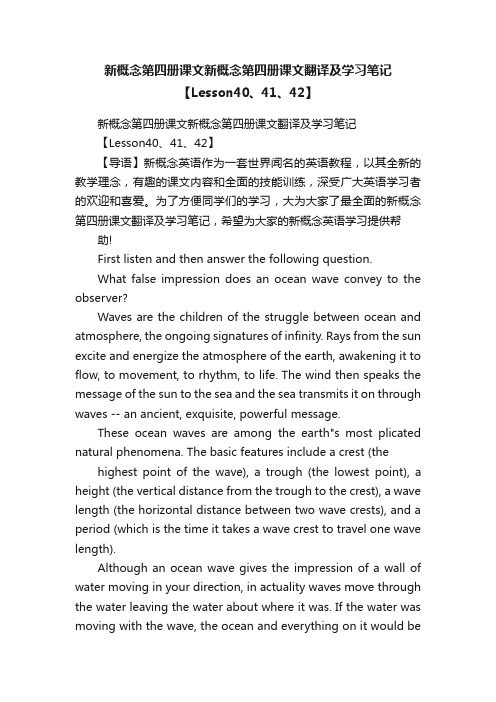
新概念第四册课文新概念第四册课文翻译及学习笔记【Lesson40、41、42】新概念第四册课文新概念第四册课文翻译及学习笔记【Lesson40、41、42】【导语】新概念英语作为一套世界闻名的英语教程,以其全新的教学理念,有趣的课文内容和全面的技能训练,深受广大英语学习者的欢迎和喜爱。
为了方便同学们的学习,大为大家了最全面的新概念第四册课文翻译及学习笔记,希望为大家的新概念英语学习提供帮助!First listen and then answer the following question.What false impression does an ocean wave convey to the observer?Waves are the children of the struggle between ocean and atmosphere, the ongoing signatures of infinity. Rays from the sun excite and energize the atmosphere of the earth, awakening it to flow, to movement, to rhythm, to life. The wind then speaks the message of the sun to the sea and the sea transmits it on through waves -- an ancient, exquisite, powerful message.These ocean waves are among the earth"s most plicated natural phenomena. The basic features include a crest (the highest point of the wave), a trough (the lowest point), a height (the vertical distance from the trough to the crest), a wave length (the horizontal distance between two wave crests), and a period (which is the time it takes a wave crest to travel one wave length).Although an ocean wave gives the impression of a wall of water moving in your direction, in actuality waves move through the water leaving the water about where it was. If the water was moving with the wave, the ocean and everything on it would beracing in to the shore with obviously catastrophic results.An ocean wave passing through deep water causes a particle on the surface to move in a roughly circular orbit, drawing the particle first towards the advancing wave, then up into the wave, then forward with it and then -- as the wave leaves the particles behind -- back to its starting point again.From both maturity to death, a wave is subject to the same laws as any other "living" thing. For a time it assumes a miraculous individuality that, in the end, is reabsorbed into the great ocean of life.The undulating waves of the open sea are generated by three natural causes: wind, earth movements or tremors, and the gravitational pull of the moon and the sun. Once waves have been generated, gravity is the force that drives them in a continual attempt to restore the ocean surface to a flat plain.from World Magazine (BBC Enterprises)signature n. 签名,标记infinity n. 无穷ray n. 光线energize v. 给与...能量rhythm n. 节奏transmit v. 传送exquisite adj. 高雅的phenomena n. 现象crest n. 浪峰trough n. 波谷vertical adj. 垂直的horizontal adj. 水平的actuality n. 现实catastrophic adj. 大灾难的 particle n. 微粒maturity n. 成熟undulate v. 波动,形成波浪 tremor n. 震颤gravitational adj. 地心吸力的1.transmit vt.①传达例句:Gypsies frequently transmit recipes orally within the family.吉普赛人经常以口头形式把秘方世代相传。
新概念英语第4册课文(中英文对照)
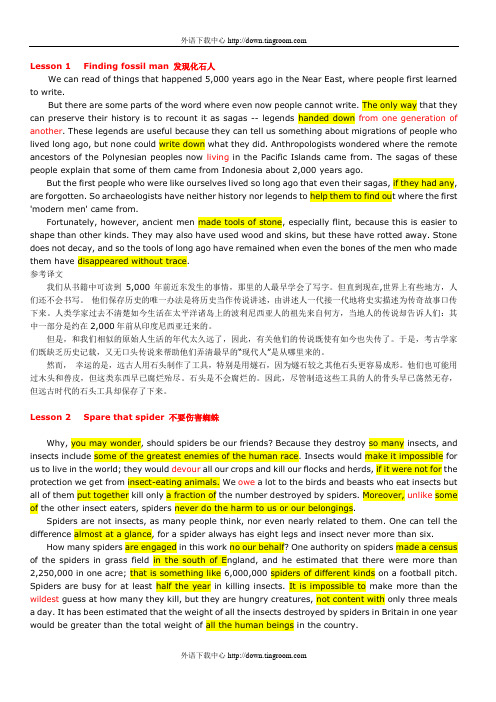
Lesson 1 Finding fossil man 发现化石人We can read of things that happened 5,000 years ago in the Near East, where people first learned to write.But there are some parts of the word where even now people cannot write. The only way that they can preserve their history is to recount it as sagas -- legends handed down from one generation of another. These legends are useful because they can tell us something about migrations of people who lived long ago, but none could write down what they did. Anthropologists wondered where the remote ancestors of the Polynesian peoples now living in the Pacific Islands came from. The sagas of these people explain that some of them came from Indonesia about 2,000 years ago.But the first people who were like ourselves lived so long ago that even their sagas, if they had any, are forgotten. So archaeologists have neither history nor legends to help them to find out where the first 'modern men' came from.Fortunately, however, ancient men made tools of stone, especially flint, because this is easier to shape than other kinds. They may also have used wood and skins, but these have rotted away. Stone does not decay, and so the tools of long ago have remained when even the bones of the men who made them have disappeared without trace.参考译文我们从书籍中可读到5,000 年前近东发生的事情,那里的人最早学会了写字。
新概念英语第四册课文详解(L1-25)
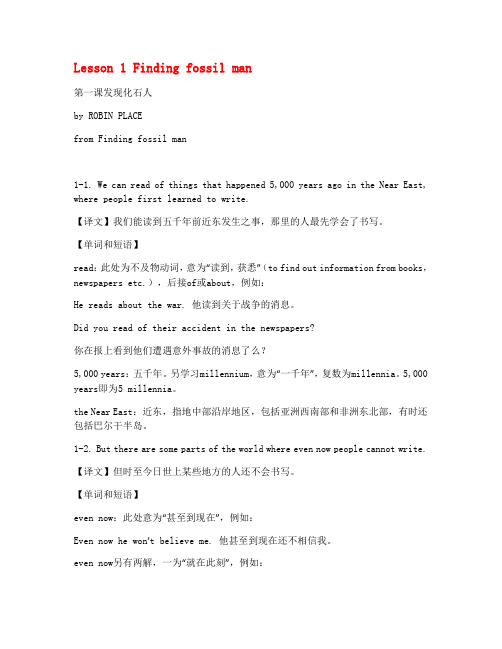
Lesson 1 Finding fossil man第一课发现化石人by ROBIN PLACEfrom Finding fossil man1-1. We can read of things that happened 5,000 years ago in the Near East, where people first learned to write.【译文】我们能读到五千年前近东发生之事,那里的人最先学会了书写。
【单词和短语】read:此处为不及物动词,意为“读到,获悉”(to find out information from books,newspapers etc.),后接of或about,例如:He reads about the war. 他读到关于战争的消息。
Did you read of their accident in the newspapers?你在报上看到他们遭遇意外事故的消息了么?5,000 years:五千年。
另学习millennium,意为“一千年”,复数为millennia。
5,000 years即为5 millennia。
the Near East:近东,指地中部沿岸地区,包括亚洲西南部和非洲东北部,有时还包括巴尔干半岛。
1-2. But there are some parts of the world where even now people cannot write.【译文】但时至今日世上某些地方的人还不会书写。
【单词和短语】even now:此处意为“甚至到现在”,例如:Even now he won’t believe me. 他甚至到现在还不相信我。
even now另有两解,一为“就在此刻”,例如:Perhaps even now the time has arrived.也许正是此刻时机来到了。
另一为“尽管这样,虽然情况如此”(in spite of what has happened),例如:I have explained everything,but even now she doesn’t understand.我什么都解释了,但是尽管如此她还是不明白。
新概念英语第四册课文翻译及学习笔记:Lesson34

【课⽂】 First listen and then answer the following question. 听录⾳,然后回答以下问题。
What do adolescents respect in parents? Parents are often upset when their children praise the homes of their friends and regard it as a slur on their own cooking, or cleaning, or furniture, and often are foolish enough to let the adolescents see that they are annoyed. They may even accuse them of disloyalty, or make some spiteful remark about the friends' parents. Such loss of dignity and descent into childish behaviour on the part of the adults deeply shocks the adolescents, and make them resolve that in future they will not talk to their parents about the places or people they visit. Before very long the parents will be complaining that the child is so secretive and never tells them anything, but they seldom realize that they have brought this on themselves . Disillusionment with the parents, however good and adequate they may be both as parents and as individuals, is to some degree inevitable. Most children have such a high ideal of their parents, unless the parents themselves have been unsatisfactory, that it can hardly hope to stand up to a realistic evaluation. Parents would be greatly surprised and deeply touched if they realized how much belief their children usually have in their character and infallibility, and how much this faith means to a child. If parents were prepared for this adolescent reaction, and realized that it was a sign that the child was growing up and developing valuable powers of observation and independent judgment, they would not be so hurt, and therefore would not drive the child into opposition by resenting and resisting it. The adolescent, with his passion for sincerity, always respects a parent who admits that he is wrong, or ignorant, or even that he has been unfair or unjust. What the child cannot forgive is the parent's refusal to admit these charges if the child knows them to be true. Victorian parents believed that they kept their dignity by retreating behind an unreasoning authoritarian attitude; in fact they did nothing of the kind, but children were then too cowed to let them know how they really felt. Today we tend to go to the other extreme, but on the whole this is a healthier attitude both for the child and the parent. It is always wiser and safer to face up to reality, however painful it may be at the moment. DOTID OFLUM Journey Through Adolescence 【New words and expressions ⽣词和短语】 adverse adj. 不利的 adolescence n. 青春期 slur n. 抵毁 adolescent n. 青少年(12-18岁) disloyalty n. 不忠实 spiteful adj. 恶意的,怀恨的 dignity n.端庄,⾼贵,尊严 disillusionment n.幻灭感 evaluation n. 评价 infallibility n. ⼀贯正确 resent v. 怨恨 sincerity n. 诚挚 victorian adj. 维多利亚式的 retreat v. 后退 unreasoning adj. 不凭理智的 authoritarian adj.专制的 cow v. 吓唬 【课⽂注释】 1.slur n. 诽谤, 耻辱, 污点, 污迹 例句:He took the remarks as a slur on his reputation. 他把这些话当作是对他的名誉的中伤。
新概念英语第四册Lesson40~44课文注释

【导语】新概念英语⽂章短⼩精悍,语句幽默诙谐,语法全⾯系统。
适合各个阶层的⼈群学习参考。
相信有了新概念英语,你也可以成为“⼤神”级别的⼈物!还在等什么?快来加⼊学习吧!⼩编与您⼀起学习进步!新概念英语第四册Lesson40课⽂注释 1 by some unavoidable circumstance,由于某些不可避免的情况。
2 with a grain of salt,有保留地。
3 a very firm hand,⼀个强有⼒的⼈。
4 with the aid of,在...的帮助下。
5 This is supposed,据说...。
新概念英语第四册Lesson41课⽂注释 1、stand up on end,竖⽴着。
2、the ideal to be aimed at,理想的⽬标。
3、I could in time...,我最终能够....。
4、help us a little further,帮助我们进⼀步搞清这个问题。
5、with the hand...hold the string...,这是⼀个祈使句,谓语动词是hold,with the hand held high in the air是介词短语作⽅式状语。
6、to and fro,来回地。
新概念英语第四册Lesson42课⽂注释 1、that given a planet...certain to start,这是⼀个宾语从句,作动词conclude的宾语,其中given a planet...our own,过去分词短语作条件状语,given与if的意思相近,这个过去分词短语可译成“如果⼀个⾏星与我们所在的⾏星⼤致相同的话”。
2、is best left unsaid,不去说(它)。
3、come up against,遇到。
新概念英语第四册Lesson43课⽂注释 1 The inner workings of our own brains,这⼀部分是feel的宾语,为了强调⽽把宾语提前了,to be uniquely worthy of investigation 是宾语补⾜语。
新概念英语4第十课讲解

新概念英语4第十课讲解Lesson 10 Silicon valley第十课硅谷from US NEWS AND WORLD REPORT, October 2,198910-1. Technology trends may push Silicon Valley back to the future.【译文】技术的发展趋势有可能把硅谷重新推向未来。
10-2. Carver Mead, a pioneer in integrated circuits and a professor of computer science at the California Institute of Technology, notes there are now work-stations that enable engineers to design, test and produce chips right on their desks, much the way an editor creates a newsletter on a Macintosh.【译文】集成电路先驱、加州理工学院计算机教授卡弗·米德注意到,现在有些计算机工作站使工程技术人员可以在他们的办公桌上设计、试验和生产芯片,如某编辑在苹果机上编出时事通讯一样。
【讲解】a pioneer in integrated circuits和 a professor of…Technology并列作Carver Mead的同位语。
enable engineers to …desks为定语从句,修饰work-stations。
much the way an editor creates a newsletter on a Macintosh中the way前省略了介词in,整个短语在句中作方式状语。
在非正式文体中,in the way中的介词in 通常被省略,例如:You’re doing it (in)the wrong way.你做这件事的方法不对。
新概念英语第四册 Lesson42 课文音标版讲义

42An earthquake comes like a thief in the night, without warning. ən ˈɜːθkweɪk kʌmz laɪk əθiːfɪn ðə naɪt, wɪˈðaʊt ˈwɔːnɪŋ.地震就像夜间的小偷,不打招呼就来了。
地震就像夜间的小偷,不打招呼就来了。
It was necessary, therefore, to invent instruments that neither slumbered nor slept. ɪt wɒz ˈnesɪsəri, ˈðeəfɔː,tuːɪnˈventˈɪnstrʊm ənts ðæt ˈnaɪðəˈslʌmbəd nɔː slept.因此,有必要发明一种仪器,既不打盹儿,也不睡觉。
因此,有必要发明一种仪器,既不打盹儿,也不睡觉。
Some devices were quite simple. sʌm dɪˈvaɪsɪz wɜː kwaɪt ˈsɪmpl. 有些装置非常简单。
有些装置非常简单。
One, for instance, consisted of rods of various lengths and thicknesses which would stand up on end like ninepins. wʌn, fɔːrˈɪnstəns, kənˈsɪstɪd ɒv rɒdz ɒv ˈveər ɪəs leŋθs ænd ˈθɪknɪsɪz wɪʧ wʊd stænd ʌp ɒn end laɪk ˈnaɪnpɪnz.例如,有一种装置是由一些长短、粗细不同的木棒组成,就像九柱戏的木棒一样坚立着,例如,有一种装置是由一些长短、粗细不同的木棒组成,就像九柱戏的木棒一样坚立着,When a shock came, it shook the rigid table upon which these stood. wen əʃɒk keɪm, ɪt ʃʊk ðəˈrɪʤɪd ˈteɪbᵊl əˈpɒn wɪʧðiːz stʊd.一旦有地震,就会震动竖立在坚硬的桌上的木棒。
新概念英语第四册课文翻译及学习笔记:Lesson4
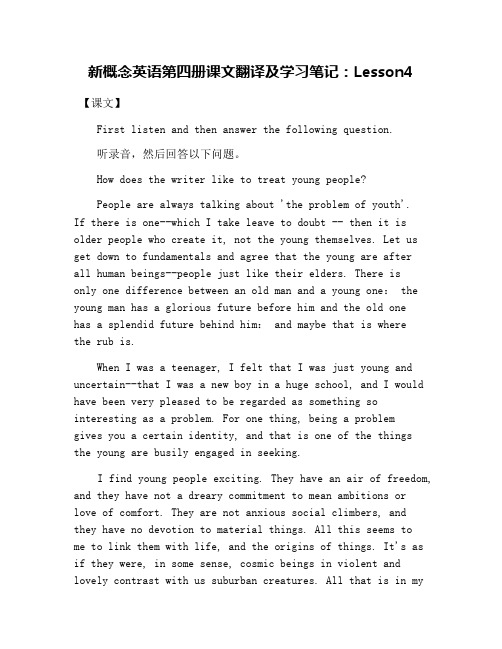
新概念英语第四册课文翻译及学习笔记:Lesson4【课文】First listen and then answer the following question.听录音,然后回答以下问题。
How does the writer like to treat young people?People are always talking about 'the problem of youth'.If there is one--which I take leave to doubt -- then it is older people who create it, not the young themselves. Let us get down to fundamentals and agree that the young are afterall human beings--people just like their elders. There isonly one difference between an old man and a young one: the young man has a glorious future before him and the old onehas a splendid future behind him: and maybe that is wherethe rub is.When I was a teenager, I felt that I was just young and uncertain--that I was a new boy in a huge school, and I would have been very pleased to be regarded as something so interesting as a problem. For one thing, being a problemgives you a certain identity, and that is one of the thingsthe young are busily engaged in seeking.I find young people exciting. They have an air of freedom, and they have not a dreary commitment to mean ambitions orlove of comfort. They are not anxious social climbers, andthey have no devotion to material things. All this seems tome to link them with life, and the origins of things. It's as if they were, in some sense, cosmic beings in violent and lovely contrast with us suburban creatures. All that is in mymind when I meet a young person. He may be conceited, ill-mannered, presumptuous or fatuous, but I do not turn for protection to dreary cliches about respect for elders -- as if mere age were a reason for respect. I accept that we are equals, and I will argue with him, as an equal, if I think he is wrong.FIELDEN HUGHES from Out of the Air, The Listene【New words and expressions 生词和短语】leave n. 允许fundamentals n. 基本原则glorious adj. 光辉灿烂的splendid adj. 灿烂的rub n. 难题identity n. 身份dreary adj. 沉郁的commitment n. 信奉mean adj. 吝啬,小气social climber 追求更高社会地位的,向上爬的人devotion n. 热爱cosmic adj. 宇宙的suburban adj. 见识不广的,偏狭的conceited adj. 自高自大的presumptuous adj. 自以为是的,放肆的fatuous adj. 愚蠢的cliche n. 陈词滥调【课文注释】1. which I take leave to doubt,这是一个插入成分,用两个破折号与句子的主要部分分开。
新概念英语第四册第2课精讲
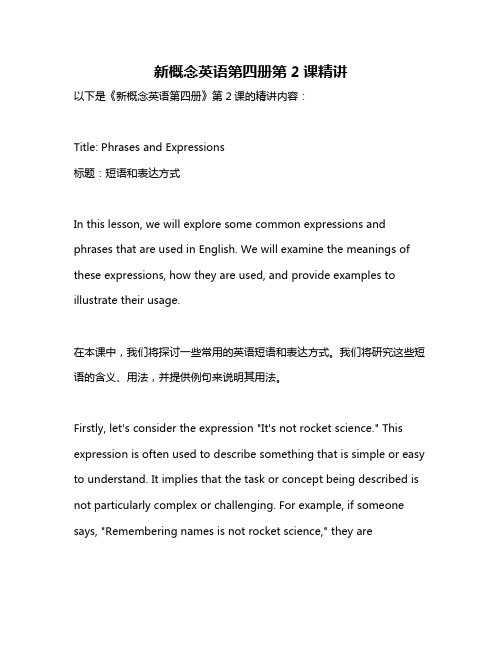
新概念英语第四册第2课精讲以下是《新概念英语第四册》第2课的精讲内容:Title: Phrases and Expressions标题:短语和表达方式In this lesson, we will explore some common expressions and phrases that are used in English. We will examine the meanings of these expressions, how they are used, and provide examples to illustrate their usage.在本课中,我们将探讨一些常用的英语短语和表达方式。
我们将研究这些短语的含义、用法,并提供例句来说明其用法。
Firstly, let's consider the expression "It's not rocket science." This expression is often used to describe something that is simple or easy to understand. It implies that the task or concept being described is not particularly complex or challenging. For example, if someone says, "Remembering names is not rocket science," they aresuggesting that remembering names is a simple task that does not require a high level of intelligence or expertise.首先,让我们考虑一下“It's not rocket science”这个短语。
新概念第四册课文精讲Lesson48

新概念第四册课文精讲Lesson48课文48 规划股份投资1009. There is no shortage of tipsters around offering'get-rich-quick' opportunities.我们周围不乏情报贩子,向人们提供迅速发财致富的机遇。
1010. But if you are a serious private investor, leave the Las Vegas mentality to those with money to fritter.但是,如果你是一个认真的私人投资者,就把拉斯韦加斯的心态留给那些有钱可供挥霍的人。
1011. The serious investor needs a proper 'portfolio' -- a well-planned selection of investments, with a definite structure and a clear aim.认真的投资者需要一份正规的投资组合表 -- 一种计划很周密的投资选择,包括你的投资结构和明确的目标。
1012. But exactly how does a newcomer to the stock market go about achieving that?但是, 一个股票市场的新手又如何能做到这个点呢?1013. Well, if you go to five reputable stock brokers and ask them what you should do with your money,如果你去向5位有威望的股票经纪人咨询,询问你应该如何使用你的资金,1014. you're likely to get five different answers,你可能得到5种不同的答复,1015. even if you give all the relevant information about your age age, family, finances and what you want from your investments.即便你提供了相关于你的年龄、家庭、财源和你想从投资中获得好处的信息。
新概念英语第四册全册课文精讲

$课文1 发现化石人1. We can read of things that happened 5,000 years ago in the Near East, where people first learned to write.我们从书籍中可读到5,000 年前近东发生的事情,那里的人最早学会了写字。
2. But there are some parts of the world where even now people cannot write.但直到现在,世界上有些地方,人们还不会书写。
3. The only way that they can preserve their history is to recount it as sagas -- legends handed down from one generation of story tales to another.他们保存历史的唯一办法是将历史当作传说讲述,由讲述人一代接一代地将史实描述为传奇故事口传下来。
4. These legends are useful because they can tell us something about migrations of people who lived long ago,这些传说是有用的,因为他们告诉我们很久以前生活在这里的移民的一些事情。
5. but none could write down what they did.但是没有人能写下来。
6. Anthropologists wondered where the remote ancestors of the Polynesian peoples now living in the Pacific Islands came from.人类学家过去不清楚如今生活在太平洋诸岛上的波利尼西亚人的祖先来自何方,7. The sagas of these people explain that some of them came from Indonesia about 2,000 years ago.当地人的传说却告诉人们:其中一部分是约在2,000年前从印度尼西亚迁来的。
- 1、下载文档前请自行甄别文档内容的完整性,平台不提供额外的编辑、内容补充、找答案等附加服务。
- 2、"仅部分预览"的文档,不可在线预览部分如存在完整性等问题,可反馈申请退款(可完整预览的文档不适用该条件!)。
- 3、如文档侵犯您的权益,请联系客服反馈,我们会尽快为您处理(人工客服工作时间:9:00-18:30)。
NEW CONCEPT ENGLISH(IV)(new version)2Lesson1Finding Fossil manWe can read of things that happened5,000years ago in the Near East,where people first learned to write.But there are some parts of the world where even now people cannot write.The only w ay that they can preserve their history is torecount it as sagas--legends handed down from one generation of story-tellersto another.These legends are useful because they can tell us somethin g aboutmigrations of people who lived long ago,but none could write down what they did. Anthropologists wondered where the remote ancestors of the Polynesianpeoples now living in th e Pacific Islands came from.The sagas of these peopleexplain that some of them came from Indo nesia about2,000years ago.But the first people who were like ourselves lived so long ago that ev en theirsagas,if they had any,are forgotten.So archaeologists have neither history nor legends to help them to find out where the first'modern men'came from.Fortunately,however,ancient me n made tools of stone,especially flint,becausethis is easier to shape than other kinds.They may also have used woodand skins,but these have rotted away.Stone does not decay,and so the tool s oflong ago have remained when even the bones of the men who made them have disappeared without trace.3Lesson2Spare that spiderWhy,you may wonder,should spiders be our friends?Because they destroy somany insects,and insects include some of the greatest enemies of the humanrace.Insects would make it impossible for us to live in the world;they woulddevour all our crops and kill our flocks and herds,if it were not for the protectionwe get from insect-eating animals.We owe a lot to the birds and beasts wh o eat insects but all of them put together kill only a fraction of the number destroyed by spiders. Moreover,unlike some of the other insect eaters,spiders never dothe least harm to us or our bel ongings.Spiders are not insects,as many people think,nor even nearly related to them.One can t ell the difference almost at a glance for a spider always has eight legsand an insect never more th an six.How many spiders are engaged in this work on our behalf?One authority on spiders made a census of the spiders in a grass field in the south of England,andhe estimated that there were more than2,250,000in one acre,that is something like6,000,000spiders of different kinds on a f ootball pitch.Spiders are busy for at least half the year in killing insects.It is impossible to make more than the wildest guess at how many they kill,but they are hungry creatures,not content wi th only three meals a day.It has been estimated that the weight of all the insects destroyed by spi ders in Britain in one year would be greater than the total weight of all the human beings in the c ountry.T.H.GILLESPIE Spare that Spider from The ListeneLesson3Matterhorn manModern alpinists try to climb mountains by a route which will give them goodsport,and the moredifficult it is,the more highly it is regarded.In the pioneeringdays,however,this was not the case at all.The early climbers were looking forthe easiest way to the top because the summit was the prize they sought,especially if it had never been attained before.It is true that during their explor ations they often faced difficulties and dangers of the most perilous nature,equipped in a manne r which would make a modern climber shudder at the thought,but they did not go out of their w ay to court such excitement.They had a single aim,a solitary goal--the top!It is hard for us to reali ze nowadays how difficult it was for the pioneers.Exceptfor one or two places such as Zermatt an d Chamonix,which had rapidly become popular,Alpine villages tended to beimpoverished settlements cut off from civilization by the high mountains.Such inns as there were were generally dirty and flea-ridden;the food simply local cheese accompanied by bread often t welve months old,all washed down with coarse wine.Often a valley boasted no inn at all,and cli mbers found shelter wherever they could--sometimes with the local priest(who was usually as p oor as his parishioners),sometimes with shepherds or cheesemakers.Invariably the background was the same:dirt and poverty,and very uncomfortable.For men accustomed to eatingseven-course dinners and sleeping between fine linen sheets at home,the change to the Alps mu st have been very hard indeed.5Lesson4Seeing handsIn the Soviet Union several cases have been reported recently of people who can read and detect colours with their fingers,and even see through solid doors and walls.One case concerns an'ele ven-year-old schoolgirl,Vera Petrova,who has normal vision but who can also perceive things wit h different parts of her skin,and through solid walls.This ability was first noticed by her father.O ne day she came into his office and happened to put her hands on the door of a locked safe.Sudd enly she asked her father why he kept so many old newspapers locked away there,and even desc ribed the way they were done up in bundles.Vera's curious talent was brought to the notice of a s cientific research institute in the town of UIyanovsk,near where she lives,and in April she was giv en a series of tests by a special commission of the Ministry of Health of the Russian Federal Repu blic.During these tests she was able to read a newspaper through an opaque screen and,strange r still,by moving her elbow over a child's game of Lotto she was able to describe the figures and c olours printed on it;and,in another instance,wearing stockings and slippers,to make out with h er foot the outlines and colours of a picture hidden under a carpet.Other experiments showed th at her knees and shoulders had a similar sensitivity.During all these tests Vera was blindfold;and, indeed,except when blindfold she lacked the ability to perceive things with her skin.lt was also f ound that although she could perceive things with her fingers this ability ceased the moment her hands were wet.6Lesson5YouthPeople are always talking about'the problem of youth'.If there is one—which I take leave to doubt--then it is older people wh o create it,not the young themselves.Let us get down tofundamentals and agree that the young are after all human bei ngs--people just like their elders.There is only one difference be tween an old man and a young one:the young man has a glorio us future before him and the old one has a splendid future behi nd him:and maybe that is where the rub is.When I was a teena ger,I felt that I was just young and uncertain--that I was a new b oy in a huge school,and I would have been very pleased to be r egarded as something so interesting as a problem.For one thin g,being a problem gives you a certain identity,and that is one of the things the young are busily engaged in seeking.I find young people exciting.They have an air of freedom,and they have n ot a dreary commitment to mean ambitions or love of comfort. They are not anxious social climbers,and they have no devotion to material things.All this seems to me to link them with life,a nd the origins of things.It's as if they were in some sense cosmi c beings in violent and lovely contrast with us suburban creatur es.All that is in my mind when I meet a young person.He may b e conceited,illmannered,presumptuous of fatuous,but I do no t turn for protection to dreary clichés about respect for elders--as if mere age were a reason for respect.I accept that we are e quals,and I will argue with him,as an equal,if I think he is wron g.7Lesson6The sporting spiritI am always amazed when I hear people saying that sport create s goodwill between the nations,and that if only the common pe oples of the world could meet one another at football or cricket ,they would have no inclination to meet on the battlefield.Eve n if one didn't know from concrete examples(the1936 Olympic Games,for instance)that international sporting contes ts lead to orgies of hatred,one could deduce it from general pri nciples.Nearly all the sports practised nowadays are competitive.You pl ay to win,and the game has little meaning unless you do your u tmost to win.On the village green,where you pick up sides and no feeling of local patriotism is involved,it is possible to play si mply for the fun and exercise:but as soon as the question of pr estige arises,as soon as you feel that you and some larger unit will be disgraced if you lose,the most savage combative instinct s are aroused.Anyone who has played even in a school football match knows this.At the international level sport is frankly mim ic warfare.But the significant thing is not the behaviour of the p layers but the attitude of the spectators:and,behind the specta tors,of the nations.who work themselves into furies over theseabsurd contests,and seriously believe--at any rate for short per iods--that running,jumping and kicking a ball are tests of nation al virtue.刘晓华liuxiaohua72@8Lesson7BatsNot all sounds made by animals serve as language,and we have only to turn to that extraordinary discovery of echo-location in bats to see a case in which thePeople are always talking about'the problem of youth'.If there is one—which I take leave to doubt--then it is older people wh o create it,not the young themselves.Let us get down to fundamentals and agree that the young are after all human bei ngs--people just like their elders.There is only one difference be tween an old man and a young one:the young man has a glorio us future before him and the old one has a splendid future behi nd him:and maybe that is where the rub is.When I was a teena ger,I felt that I was just young and uncertain--that I was a new b oy in a huge school,and I would have been very pleased to be r egarded as something so interesting as a problem.For one thin g,being a problem gives you a certain identity,and that is one of the things the young are busily engaged in seeking.I find young people exciting.They have an air of freedom,and they have not a dreary commitment to mean ambitions or love of comfort. They are not anxious social climbers,and they have no devotion to material things.All this seems to me to link them with life,a nd the origins of things.It's as if they were in some sense cosmi c beings in violent and lovely contrast with us suburban creatur es.All that is in my mind when I meet a young person.He may b e conceited,illmannered,presumptuous of fatuous,but I do no t turn for protection to dreary clichés about respect for elders--as if mere age were a reason for respect.I accept that we are e quals,and I will argue with him,as an equal,if I think he is wron g.7Lesson6The sporting spiritI am always amazed when I hear people saying that sport create s goodwill between the nations,and that if only the common pe oples of the world could meet one another at football or cricket ,they would have no inclination to meet on the battlefield.Eve n if one didn't know from concrete examples(the1936 Olympic Games,for instance)that international sporting contes ts lead to orgies of hatred,one could deduce it from general pri nciples.Nearly all the sports practised nowadays are competitive.You play to win,and the game has little meaning unless you do your u tmost to win.On the village green,where you pick up sides and no feeling of local patriotism is involved,it is possible to play si mply for the fun and exercise:but as soon as the question of pr estige arises,as soon as you feel that you and some larger unit will be disgraced if you lose,the most savage combative instinct s are aroused.Anyone who has played even in a school football match knows this.At the international level sport is frankly mim ic warfare.But the significant thing is not the behaviour of the p layers but the attitude of the spectators:and,behind the specta tors,of the nations.who work themselves into furies over these absurd contests,and seriously believe--at any rate for short per iods--that running,jumping and kicking a ball are tests of nation al virtue.刘晓华liuxiaohua72@8Lesson7BatsNot all sounds made by animals serve as language,and we have only to turn to that extraordinary discovery of echo-location in bats to see a case in which thePeople are always talking about'the problem of youth'.If there is one—which I take leave to doubt--then it is older people wh o create it,not the young themselves.Let us get down tofundamentals and agree that the young are after all human bei ngs--people just like their elders.There is only one difference be tween an old man and a young one:the young man has a glorio us future before him and the old one has a splendid future behi nd him:and maybe that is where the rub is.When I was a teena ger,I felt that I was just young and uncertain--that I was a new b oy in a huge school,and I would have been very pleased to be r egarded as something so interesting as a problem.For one thin g,being a problem gives you a certain identity,and that is one of the things the young are busily engaged in seeking.I find young people exciting.They have an air of freedom,and they have n ot a dreary commitment to mean ambitions or love of comfort. They are not anxious social climbers,and they have no devotion to material things.All this seems to me to link them with life,a nd the origins of things.It's as if they were in some sense cosmi c beings in violent and lovely contrast with us suburban creatur es.All that is in my mind when I meet a young person.He may b e conceited,illmannered,presumptuous of fatuous,but I do no t turn for protection to dreary clichés about respect for elders--as if mere age were a reason for respect.I accept that we are e quals,and I will argue with him,as an equal,if I think he is wron g.7Lesson6The sporting spiritI am always amazed when I hear people saying that sport create s goodwill between the nations,and that if only the common pe oples of the world could meet one another at football or cricket ,they would have no inclination to meet on the battlefield.Eve n if one didn't know from concrete examples(the1936 Olympic Games,for instance)that international sporting contes ts lead to orgies of hatred,one could deduce it from general pri nciples.Nearly all the sports practised nowadays are competitive.You pl ay to win,and the game has little meaning unless you do your u tmost to win.On the village green,where you pick up sides and no feeling of local patriotism is involved,it is possible to play si mply for the fun and exercise:but as soon as the question of pr estige arises,as soon as you feel that you and some larger unit will be disgraced if you lose,the most savage combative instinct s are aroused.Anyone who has played even in a school football match knows this.At the international level sport is frankly mim ic warfare.But the significant thing is not the behaviour of the p layers but the attitude of the spectators:and,behind the specta tors,of the nations.who work themselves into furies over theseabsurd contests,and seriously believe--at any rate for short per iods--that running,jumping and kicking a ball are tests of nation al virtue.刘晓华liuxiaohua72@8Lesson7BatsNot all sounds made by animals serve as language,and we have only to turn to that extraordinary discovery of echo-location in bats to see a case in which the。
